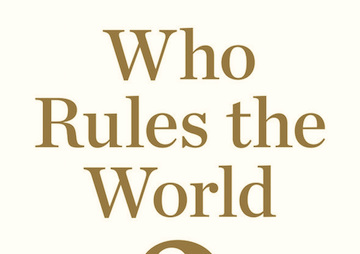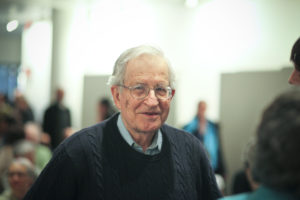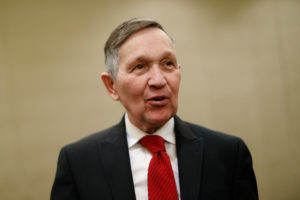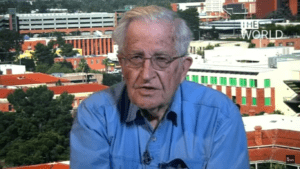The Costs of Violence: Masters of Mankind (Part 2)
Returning to the opening question “Who rules the world?” we might also want to pose another question: “What principles and values rule the world?” 1
2
1
2
Al-Qaeda/ISIS are assisted by Americans who follow their directives: for example, Ted “carpet-bomb ’em” Cruz, a top Republican presidential candidate. Or, at the other end of the mainstream spectrum, the leading Middle East and international affairs columnist of the New York Times, Thomas Friedman, who in 2003 offered Washington advice on how to fight in Iraq on the Charlie Rose show: “There was what I would call the terrorism bubble… And what we needed to do was to go over to that part of the world and burst that bubble. We needed to go over there basically, and, uh, take out a very big stick, right in the heart of that world, and burst that bubble. And there was only one way to do it… What they needed to see was American boys and girls going house to house from Basra to Baghdad, and basically saying, which part of this sentence don’t you understand? You don’t think we care about our open society, you think this bubble fantasy we’re going to just let it go? Well, suck on this. Ok. That, Charlie, was what this war was about.”
That’ll show the ragheads.
Looking Forward
Atran and other close observers generally agree on the prescriptions. We should begin by recognizing what careful research has convincingly shown: those drawn to jihad “are longing for something in their history, in their traditions, with their heroes and their morals; and the Islamic State, however brutal and repugnant to us and even to most in the Arab-Muslim world, is speaking directly to that… What inspires the most lethal assailants today is not so much the Quran but a thrilling cause and a call to action that promises glory and esteem in the eyes of friends.” In fact, few of the jihadis have much of a background in Islamic texts or theology, if any.
The best strategy, Polk advises, would be “a multinational, welfare-oriented and psychologically satisfying program… that would make the hatred ISIS relies upon less virulent. The elements have been identified for us: communal needs, compensation for previous transgressions, and calls for a new beginning.” He adds, “A carefully phrased apology for past transgressions would cost little and do much.” Such a project could be carried out in refugee camps or in the “hovels and grim housing projects of the Paris banlieues,” where, Atran writes, his research team “found fairly wide tolerance or support for ISIS’s values.” And even more could be done by true dedication to diplomacy and negotiations instead of reflexive resort to violence.
Not least in significance would be an honorable response to the “refugee crisis” that was a long time in coming but surged to prominence in Europe in 2015. That would mean, at the very least, sharply increasing humanitarian relief to the camps in Lebanon, Jordan, and Turkey where miserable refugees from Syria barely survive. But the issues go well beyond, and provide a picture of the self-described “enlightened states” that is far from attractive and should be an incentive to action.
There are countries that generate refugees through massive violence, like the United States, secondarily Britain and France. Then there are countries that admit huge numbers of refugees, including those fleeing from Western violence, like Lebanon (easily the champion, per capita), Jordan, and Syria before it imploded, among others in the region. And partially overlapping, there are countries that both generate refugees and refuse to take them in, not only from the Middle East but also from the U.S. “backyard” south of the border. A strange picture, painful to contemplate.
An honest picture would trace the generation of refugees much further back into history. Veteran Middle East correspondent Robert Fisk reports that one of the first videos produced by ISIS “showed a bulldozer pushing down a rampart of sand that had marked the border between Iraq and Syria. As the machine destroyed the dirt revetment, the camera panned down to a handwritten poster lying in the sand. ‘End of Sykes-Picot,’ it said.”
For the people of the region, the Sykes-Picot agreement is the very symbol of the cynicism and brutality of Western imperialism. Conspiring in secret during World War I, Britain’s Mark Sykes and France’s François Georges-Picot carved up the region into artificial states to satisfy their own imperial goals, with utter disdain for the interests of the people living there and in violation of the wartime promises issued to induce Arabs to join the Allied war effort. The agreement mirrored the practices of the European states that devastated Africa in a similar manner. It “transformed what had been relatively quiet provinces of the Ottoman Empire into some of the least stable and most internationally explosive states in the world.”
Repeated Western interventions since then in the Middle East and Africa have exacerbated the tensions, conflicts, and disruptions that have shattered the societies. The end result is a “refugee crisis” that the innocent West can scarcely endure. Germany has emerged as the conscience of Europe, at first (but no longer) admitting almost one million refugees — in one of the richest countries in the world with a population of 80 million. In contrast, the poor country of Lebanon has absorbed an estimated 1.5 million Syrian refugees, now a quarter of its population, on top of half a million Palestinian refugees registered with the U.N. refugee agency UNRWA, mostly victims of Israeli policies.
Europe is also groaning under the burden of refugees from the countries it has devastated in Africa — not without U.S. aid, as Congolese and Angolans, among others, can testify. Europe is now seeking to bribe Turkey (with over two million Syrian refugees) to distance those fleeing the horrors of Syria from Europe’s borders, just as Obama is pressuring Mexico to keep U.S. borders free from miserable people seeking to escape the aftermath of Reagan’s GWOT along with those seeking to escape more recent disasters, including a military coup in Honduras that Obama almost alone legitimized, which created one of the worst horror chambers in the region.
Words can hardly capture the U.S. response to the Syrian refugee crisis, at least any words I can think of.
Returning to the opening question “Who rules the world?” we might also want to pose another question: “What principles and values rule the world?” That question should be foremost in the minds of the citizens of the rich and powerful states, who enjoy an unusual legacy of freedom, privilege, and opportunity thanks to the struggles of those who came before them, and who now face fateful choices as to how to respond to challenges of great human import.
Noam Chomsky is institute professor emeritus in the Department of Linguistics and Philosophy at Massachusetts Institute of Technology. A TomDispatch regular, among his recent books are Hegemony or Survival and Failed States. This essay, the second of two parts, is excerpted from his new book, Who Rules the World? (Metropolitan Books, the American Empire Project, 2016). To read part 1, click here. His website is www.chomsky.info.
Follow TomDispatch on Twitter and join us on Facebook. Check out the newest Dispatch Book, Nick Turse’s Next Time They’ll Come to Count the Dead, and Tom Engelhardt’s latest book, Shadow Government: Surveillance, Secret Wars, and a Global Security State in a Single-Superpower World.
Copyright 2016 Valeria Galvao Wasserman-Chomsky Your support matters…Independent journalism is under threat and overshadowed by heavily funded mainstream media.
You can help level the playing field. Become a member.
Your tax-deductible contribution keeps us digging beneath the headlines to give you thought-provoking, investigative reporting and analysis that unearths what's really happening- without compromise.
Give today to support our courageous, independent journalists.






You need to be a supporter to comment.
There are currently no responses to this article.
Be the first to respond.